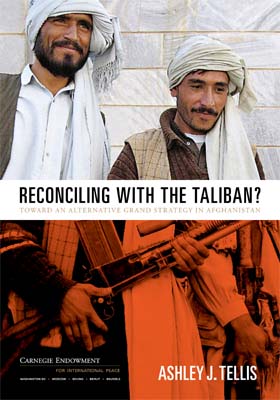Negotiating with the Taliban—who are convinced military victory is within sight—is the worst possible approach to stabilizing Afghanistan, and one that would fail. Ashley J. Tellis warns that U.S. signals of impatience and a desire for an early exit could motivate insurgents to maintain a hard line and outlast the international coalition. Though costly, a long-term commitment to building an effective Afghan state is the only way to achieve victory and defend U.S. national security objectives.
Key Conclusions:
- Negotiation with the Taliban is premature and unnecessary. Afghan stability can be achieved through a concerted modification of current military and political strategy—sustaining commitment from Washington, returning to successful counterinsurgency operations, and improving Afghan governance.
- A lasting peace in Afghanistan and defeat of the Taliban can only come from a political-military victory that diminishes the rewards for continued resistance. The Taliban’s leadership does not want conciliation. Initiating unwanted negotiations could exacerbate ethnic fissures in Afghanistan, signal weakness or defeat in Washington and Kabul, and ultimately renew civil war.
- The United States must reaffirm the goal of building a democratic and stable Afghan state. Counterterrorism and state-building are not mutually exclusive. Washington cannot fight al-Qaeda and its allies in Afghanistan and Pakistan without supporting the creation of an effective and responsive regime in Kabul.
- Although counterterrorism cooperation by Pakistan is desirable for U.S. success in Afghanistan, American goals in Afghanistan can be—and if necessary must be—attained without Islamabad’s assistance.
- Portending coalition defeat in the “graveyard of empires” is an inadequate analogy. Neither the British nor Soviet experience mimics the current situation. Military superiority aside, the U.S. presence in Kabul is seen less as occupation than support for the Afghan people, much to its advantage. The Afghan public, by a margin of 82 percent to 4 percent, oppose the Taliban and desperately seek success from Western military forces.
- President Obama’s recently announced “Af-Pak” strategy is courageous and responsible, but still incomplete. The administration needs to commit to building a democratic Afghan state, persevering in Afghanistan over the long term, deploying additional U.S. resources and troops, correct command and control deficiencies, and enlarging the size of Afghanistan’s national security forces, among other things.
Tellis explains:
“Mullah Omar and the Taliban leadership have decisively rejected any reconciliation with the government of Afghanistan. And the tribal chiefs, village elders, and street fighters, who either
support the insurgency or are sitting on the sidelines currently but are susceptible to being reconciled in principle, certainly will not take any steps in that direction so long as the Karzai regime, and its Western supporters, are not seen to be winning in their long-running battle against the Taliban. The coalition, therefore, is confronted by an inescapable paradox: any meaningful accommodation with those reconcilable segments of the rebellion will only come at the tail end of political-military success in Afghanistan and not as a precursor to it; yet, if such success is attained, reconciliation will become possible but, ironically, when it is least necessary.”

.jpg)



